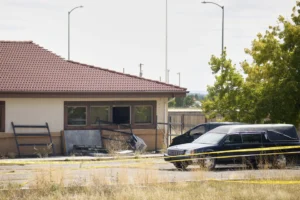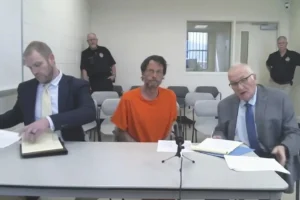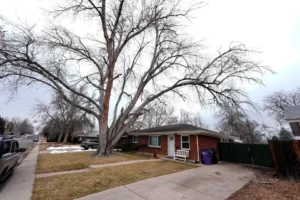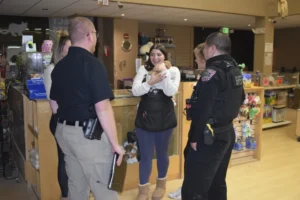Sobriety Program intended to help has in some cases caused harm
Teton County rules called unfair, unconstitutional
- Published In: Criminal Justice
- Last Updated: Aug 17, 2021
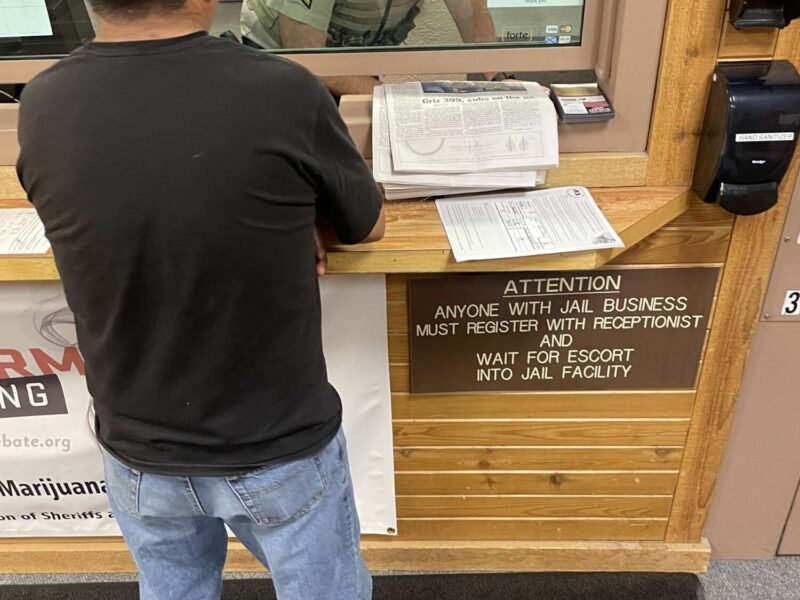
A participant in the 24/7 Sobriety Program appears at a twice-daily check-in at the Teton County Courthouse to get tested for alcohol and/or drugs. Participants cannot show up more than 30 minutes late for any tests or they risk being sent to jail. (Wyoming Truth photo by Aline Garcia-Lopez)
By Aline Garcia-Lopez, Shawn Gremp, Cristian Soles and Madeline Thulin
The Wyoming Truth
JACKSON, Wyo. —Last month, a single mother in her late 20s was arrested in Jackson for driving under the influence of alcohol. She said her Miranda rights to remain silent and to get an attorney were never read to her, and she was carted off to jail, while her car was towed away.
And that’s just when her real troubles began.
A first-time criminal offender, she was placed in the state-sanctioned 24/7 Sobriety Program, an alternative to incarceration for individuals charged with alcohol- and drug-related offenses.
One Sunday, the single mother got caught in a traffic snarl in the Jackson Hole area and showed up 43 minutes late. She blew into a Breathalyzer, which proved she was sober. But it didn’t matter. She was placed under arrest for being more than 30 minutes late. Again, she said authorities didn’t read her Miranda rights. She was placed in jail June 27 at 7:43 a.m. and was held for 31 hours. She was released a day and a half later, on June 28 at 2:55 p.m.
The result: Absent from her job as an operations officer at a local hotel, she was fired.

Her situation was compounded by a series of medical conditions for which she takes medication — insomnia, depression and attention deficit hyperactivity disorder. She wasn’t only jailed. She didn’t merely lose her job. In addition to the fees associated with the program, she also had to pay $200 to get her car released from the tow yard and another $300 in fines, along with another $200 for a drug and alcohol evaluation.
“The sheriff’s department does not care,” said the single mother of two. She spoke to The Wyoming Truth as part of a months-long examination of the 24/7 Sobriety Program on the condition of anonymity because she said she is concerned about her reputation in the community.
Under the rules of the program run by the Teton County Sheriff’s Office, the single mother was required to submit to Breathalyzer tests twice a day — once in the morning between 6 a.m. to 7 a.m. and once at night between 9 p.m. and 10 p.m. The judge decides how long a participant remains enrolled, according to Sarah King, the Alternatives to Incarceration coordinator for the Teton County Sheriff’s Office, adding that the average is 3 to 4 weeks with a maximum of 8 months. Surprisingly, the single mother said she was never given a time frame despite having been enrolled for several weeks now.

Under the program, if a participant is 1 to 30 minutes late, this is considered a tardy; more than 30 minutes late is deemed a “missed test.” According to the program’s rules, if a participant fails a test, accumulates a total of three tardies, or has “missed” a test, that person is immediately arrested. All participants are required to pay a $30 enrollment fee, along with $10 per drug test and $2 per Breathalyzer test; as a result, participants pay at least $28 a week. The Attorney General uses the fees collected from participants in the 24/7 Sobriety Program to pay the participating vendors. From the fees remaining, no less than 75 percent is returned to the Sheriff’s Office. All funds collected are to be used to conduct and enhance the program, according to Sheriff Matt Carr of the Teton County Sheriff’s Office. In Teton County, the majority of the funds collected go to distributing portable breath tests, a handheld device which tests for traces of alcohol.
What happened to the single mother is not unique. Stephen Collins, a resident of the Jackson area for almost 11 years, was arrested for driving under the influence in April 2020; this was his second DUI. Since being placed in the program, Collins has passed all his Breathalyzer tests, but like the single mother, he was arrested and held for 24 hours in early June for showing up more than 30 minutes late.
Collins agrees with the single mother that the program is unfair and burdensome, but his biggest complaint was the treatment by officers. Collins suffers from a medical condition that causes sporadic numbness in his hands and feet. On the night of his initial arrest, when placed in handcuffs, he said he started to lose feeling in his hands. He explained this to the officers, and asked if he could see a nurse, but Collins said in an interview for this story, “they didn’t care.” As a result, Collins spent the next two months getting treatment on his hands to regain feeling.
National successes, local problems
The 24/7 Sobriety Program, which originated in South Dakota in January 2005, has reduced DUIs and related traffic fatalities in other states and communities. It started as a pilot program with five counties participating. Today, the program functions in the majority of South Dakota counties. Alaska, Montana, North Dakota and Wyoming also have implemented the 24/7 Program, while Arizona, Arkansas, Colorado, Georgia, Hawaii, Illinois, Indiana, Kansas, Louisiana, Minnesota, Nevada, New Mexico and Utah are in the pilot phase.
South Dakota officials report that it has reduced the state’s recidivism rates for DUIs by 12 percent and domestic violence by 9 percent. The Montana 24/7 Sobriety Program, implemented in 2011, recorded a 30 percent decrease in alcohol-related motor vehicle fatalities in 2013 despite overall highway fatalities increasing by 10 percent in the same time period.
Wyoming adopted the program in 2014, but only five of the state’s 23 counties — Teton, Campbell, Fremont, Sheridan and Sweetwater — participate in the program. It launched in Teton County in September 2020.
Carr, the sheriff, says the program keeps the Teton County community safer, holds participants accountable and reduces the jail population. But Carr acknowledged that the program shouldn’t be used for first-time offenders, such as this single mother. That decision is left up to the judges.
“The whole premise of the program is to keep people out of jail,” he said in an interview for this story. “We’re trying to hold them accountable, but we don’t want to incarcerate them.”
King, the program coordinator, agrees with Carr and says, “this program serves as a good deterrent, especially to repeat offenders.” She also acknowledged that forcing the participants to pay is a “big financial burden,” but she thinks the “positives outweigh the negatives.”
Questions, however, remain about the program.

What was intended to help people out of the wilderness of alcohol and substance abuse has done more damage than good, said the out-of-work mother. “Getting arrested for being late and losing my job… has not helped my life at all,” she said.
Several criminal defense attorneys in the region have echoed her concerns, maintaining that the program needs to be fixed immediately. Elisabeth M.W. Trefonas, a senior assistant public defender who serves as the head public defender for Teton and Sublette counties, said the program “detains and arrests defendants without due process and in violation of their rights when the defendant has not done anything dangerous or failed in their sobriety.” (Trefonas serves on the board of advisors of The Wyoming Truth.)
However, King believes these arrests are “fair to a certain extent and maintain the integrity of the program.” She also states that Teton County Circuit Court Judge James Radda works hard to make sure participants who are arrested on the weekends are released as soon as possible to help them maintain their jobs.
Natrona County used the program for two years but stopped in early 2019 as it was “too much of a hassle,” according to Lt. Gordon Clapp of the Natrona County Sheriff’s Office. Clapp said the program was “a good option for getting people out of jail.” However, he added that the program was “too expensive,” was rarely used by the judge and therefore was discontinued.
The program’s goal is admirable by any measure — to decrease the number of people in jail and reduce the number of repeat offenders. The program allows individuals awaiting trial to be released back into the community provided they conform to the program’s rules.
In Teton County, if participants are arrested for failing a Breathalyzer test or missing an appointment while in the program, they are held until they are brought before a judge, which usually occurs at 1:30 p.m. every day except Tuesdays and Sundays. However, if you are unfortunate enough to be arrested on the weekend, you risk spending a couple of nights in jail, according to Richard D. Stout, a prominent local defense attorney who has represented many clients in the program. Stout said that as a result of the 24/7 Sobriety Program, individuals are arrested and detained more often compared to the previous system where someone charged with an offense would plead not guilty, be released on bail, then return to court for trial. In the previous system, while out on bail, the judge might require the individual to submit to regular alcohol or drug tests; however, if the individual failed, they would not be arrested unless the police could prove the participant had driven to the testing site intoxicated.

Fees can be another problem for participants as they are often too expensive for many Teton County residents. Ryann Linthicum, a counselor at the Curran-Seeley Foundation, a drug and alcohol center in Jackson, was unaware of the fees associated with the 24/7 program until recently. She said that while clients must pay their dues, “at some point or another, it becomes difficult to pay,” creating another obstacle to their recovery.
Sheriff Carr can waive the test fee for individuals who struggle financially, but it is at his discretion. King points out that Teton County is the only program in the state that does not arrest individuals who cannot afford to pay for these tests.
Hearings can occur within 24 hours of an arrest, and if Trefonas, the public defender, cannot get there in time, the clients are left to represent themselves without an attorney.
That raises questions about the program’s constitutionality, according to Stout, the local defense attorney. He said that forcing participants to represent themselves before an attorney can be present in court may violate their Sixth Amendment right to counsel.
In addition, these arrests do not require a warrant, meaning that a judge has not signed off on the arrest, and the arrest may also be based on actions that are not even illegal, such as being late to a test. This raises issues regarding an individual’s Fourth Amendment right against unreasonable searches and seizures.
Lauren McLane, director of the Defender Aid Clinic and assistant professor of law at the University of Wyoming, when asked about the constitutionality of these arrests, said, “defendants that are in a pretrial status who are presumed innocent, there is no probable cause to search or arrest them. We cannot just throw people in jail for 12 hours just for being late. It should really concern the judges that they authorize a program that is unlawfully searching and seizing people under the Fourth Amendment.”
Stout said the program should not be used by first-time offenders, but rather those who have been charged with multiple DUIs and are potentially a danger to themselves and the community.
Wyoming wrangles with rules
Within the five Wyoming counties that have adopted the 24/7 Sobriety Program, testing rules vary. In Campbell County, which joined the program in 2017, a first violation results in the participant being jailed for 12 hours; a second violation results in 24 hours; and if someone violates the program a third time, they are jailed until seen by a judge. This system is different than in Teton County, where all violations result in detention until seen by the judge.
In 2016, Sweetwater became the first county to adopt the program in Wyoming; however, the program is shut down due to COVID-19. Sgt. Gerald Carr of the Sweetwater County Sheriff’s Office said he strongly believes in the program, saying only three people have failed the program over the past four years. Sweetwater’s violation procedure is identical to Campbell County’s.
Since Teton County joined the program last year, more than 150 residents have participated with 47 enrolled. As of the end of June, the sheriff’s office has administered 6,825 preliminary Breathalyzer tests with only 16 coming back positive; 844 drug tests have been administered, with 41 coming back positive. According to the sheriff’s office, 56 people have been arrested for not complying with the program’s rules.
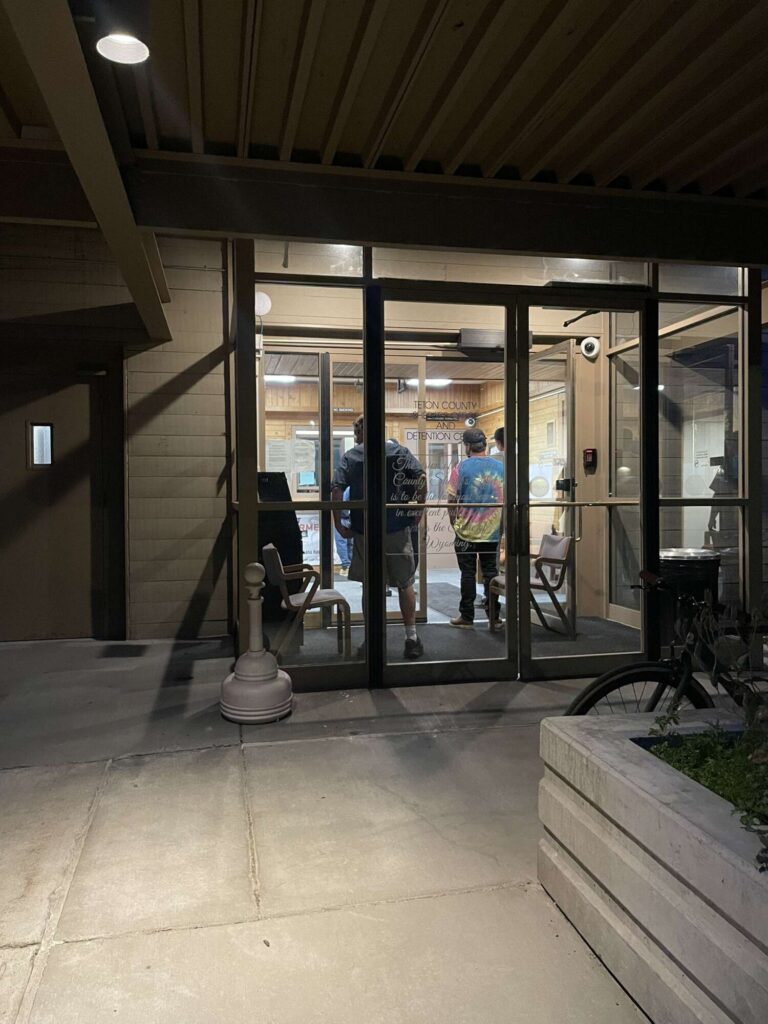
Carr started working for the Teton County Sheriff’s Office in 1999 when the jail population held more than 40 people at a time, he said. Now that population is in the single digits. Carr attributes part of this decline to the 24/7 program and a similar program that was in place before. When asked if there is anything he would like to change to the 24/7 program, Carr said he would prefer that participants were not required to pay the various fees, given the financial burden for some residents. He also said he believes the Wyoming attorney general should set clearer rules for the sheriff’s department to follow about how much discretion the department has in arresting someone who arrives more than 30 minutes late.
The single mother, who remains out of work, agrees with the sheriff that the fees are onerous. But she insists there is a broader problem with the 24/7 program: “It feels really unfair.”


